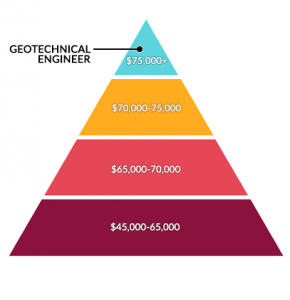Not known Details About Geotheta
Not known Details About Geotheta
Blog Article
Geotheta Things To Know Before You Buy
Table of Contents6 Easy Facts About Geotheta ExplainedAll About GeothetaNot known Details About Geotheta Little Known Facts About Geotheta.Geotheta Things To Know Before You Get This

They conduct site investigations, gather samples, perform research laboratory examinations, and evaluate data to examine the viability of the ground for construction projects - Geotechnical Engineers. Based on their searchings for, geotechnical engineers provide referrals for foundation layout, slope stability, retaining frameworks, and reduction of geotechnical dangers. They collaborate with various other professionals, such as architects, structural engineers, and construction groups, to ensure that geotechnical factors to consider are incorporated right into the total job layout and execution
By analyzing the behavior and residential properties of soil and rock, they can recognize potential geotechnical risks such as landslides, soil settlement, or slope instability. Their expertise assists avoid failings or crashes that might threaten lives and residential or commercial property. Here are some detailed obligations and responsibilities of a geotechnical designer: Website Investigation: Geotechnical engineers conduct website examinations to collect data on subsurface problems.
They translate the information to understand the residential or commercial properties and actions of the dirt and rock, including their stamina, leaks in the structure, compaction attributes, and groundwater problems. Geotechnical Analysis and Layout: Geotechnical designers examine the data gathered throughout website examinations to assess the stability and viability of the site for building tasks. They execute geotechnical estimations and modeling to examine elements such as bearing capability, negotiation, slope security, side planet stress, and groundwater flow.
The Only Guide for Geotheta
Structure Design: Geotechnical designers play an important function in making foundations that can securely sustain the designated structure. They assess the dirt conditions and tons demands to identify the proper foundation type, such as shallow structures (e.g., footings), deep structures (e.g (https://ameblo.jp/geotheta/entry-12862281966.html)., stacks), or specialized strategies like soil renovation. They think about elements such as settlement limits, birthing capacity, and soil-structure interaction to create optimal foundation layouts
They assess construction strategies, monitor website tasks, and carry out field inspections to verify that the design recommendations are complied with. If unanticipated geotechnical issues emerge, they analyze the circumstance and offer suggestions for removal or changes to the layout. Danger Analysis and Reduction: Geotechnical designers assess geotechnical dangers and risks related to the project website, such as landslides, liquefaction, or soil disintegration.

Collaboration and Communication: Geotechnical engineers work carefully with various other experts included in a project, such as architects, structural designers, and building teams. Effective communication and partnership are necessary to incorporate geotechnical considerations right into the total job design and construction process. Geotechnical engineers offer technical know-how, answer questions, and make sure that geotechnical needs are met.
A Biased View of Geotheta
Right here are some sorts of geotechnical engineers: Foundation Designer: Structure engineers concentrate on making and evaluating structures for structures. They examine the dirt conditions, load demands, and site attributes to identify one of the most ideal structure kind and style, such as superficial structures, deep structures, or specialized techniques like stack structures.
They examine the factors influencing incline security, such as soil properties, groundwater conditions, and incline geometry, and develop methods to protect against slope failures and minimize threats. over at this website Quake Engineer: Quake designers concentrate on analyzing and developing frameworks to endure seismic pressures. They analyze the seismic danger of a website, assess soil liquefaction capacity, and create seismic style standards to make sure the security and resilience of structures throughout earthquakes.
They do area screening, gather samples, and examine the accumulated information to identify the soil buildings, geologic formations, and groundwater conditions at a site. Geotechnical Instrumentation Designer: Geotechnical instrumentation designers concentrate on tracking and measuring the actions of dirt, rock, and frameworks. They set up and keep instrumentation systems that keep track of elements such as soil settlement, groundwater levels, slope activities, and structural variations to analyze performance and give very early warnings of prospective issues.
Geotheta for Dummies
They carry out examinations such as triaxial examinations, combination examinations, direct shear tests, and leaks in the structure tests to gather data for geotechnical evaluation and style. Geosynthetics Designer: Geosynthetics engineers specialize in the design and application of geosynthetic materials, such as geotextiles, geogrids, and geomembranes. They utilize these products to boost soil security, strengthen slopes, provide drain services, and control erosion.
They often tend to be investigatory individuals, which suggests they're intellectual, introspective, and inquisitive. They are curious, systematic, sensible, logical, and logical. Some of them are also social, indicating they're kind, charitable, cooperative, patient, caring, practical, compassionate, sensible, and pleasant - Consulting Engineers.
In the office environment, geotechnical engineers make use of specialized software application tools to execute estimations, produce designs, and assess data. They prepare reports, review job specs, interact with customers and team participants, and coordinate task activities. The office setup gives a favorable setting for research, analysis, and partnership with other professionals included in the task.
The Best Guide To Geotheta
They frequently visit task websites to carry out website examinations, evaluate geotechnical problems, and gather information for analysis. These gos to include traveling to different locations, sometimes in remote or tough terrains. Geotechnical designers may carry out soil tasting, conduct examinations, and display building and construction activities to ensure that the geotechnical aspects of the job are being implemented properly.
Geotechnical engineers additionally work in specialized geotechnical research laboratories. Geotechnical lab designers function thoroughly in these settings, handling screening tools, running tools, and videotaping information.
Report this page